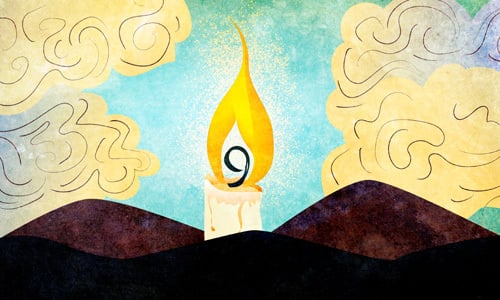
Heightened mourning, uplifting visions and rejoicing with mitzvot
During this time, we don’t:
- Eat meat (including poultry) or drink wine, for during this period the sacrifices and wine libations in the Holy Temple ceased.2 The exceptions to this rule are meat and wine consumed on Shabbat or as part of a meal that celebrates a mitzvah, such as a circumcision, bar mitzvah, or the completion of a tractate of the Talmud.
- Launder clothing (except for a baby’s)—even if they will not be worn during the Nine Days—or wear freshly laundered outer clothing.3 Those who wish to change their clothing daily should prepare a number of garments and briefly don each of them before the onset of the Nine Days. Then it is permitted to wear these “non-freshly laundered” garments during the Nine Days.We don’t consume meat or wine, for during this period the sacrifices and wine libations ceased
- Swim or bathe for pleasure.
- Remodel or expand a home.
- Plant trees to be used for shade or fragrance (as opposed to fruit trees).
- Buy, sew, weave or knit new clothing—even if they will be worn only after the Nine Days.
Exceptions to this rule: (a) If you will miss a major sale, or if the garment will be unavailable later. (b) For the purpose of a mitzvah, such as purchasing new clothing for a bride and groom. - Cut nails during the actual week of the fast of Tisha B’Av—i.e., starting from the Saturday night before the fast until the conclusion of the Nine Days.
The Sephardic custom is to observe the stringencies regarding bathing only in the week of Tisha B’Av.
Some more observances:
- The Sanctification of the Moon is postponed until after Tisha B’Av.
- There is no law forbidding traveling during the Nine Days; however, it is customary to refrain from traveling (or engaging in any potentially perilous activity) during these days, unless it is absolutely necessary.
- One may become engaged to be married during this period, but no celebration should be held until after Tisha B’Av.
Note: All these restrictions are in addition to the restrictions that apply during all of the Three Weeks.
Shabbat Chazon
The Shabbat preceding the Ninth of Av is called Shabbat Chazon—“Shabbat of the Vision.” This Shabbat’s reading from the Prophets begins with the words Chazon Yeshayahu, the “vision of Isaiah” regarding the destruction of the Holy Temple. The legendary chassidic master Rabbi Levi Yitzchak of Berditchev said that on this special Shabbat, every Jewish soul is shown a vision of the third Holy Temple. The purpose of this vision is to arouse within every Jew a yearning to actually see this edifice which will be built by G?d, and to do as many mitzvot as possible in order to realize this dream. While this vision may not be sensed with the physical eyes, the soul certainly experiences this vision, and it affects the person on the subconscious level.
There is no mourning on Shabbat—click here for more on this topic.
If We try to moderate the sadness through participating in permissible celebrationspossible, this week’s havdalah wine or grape juice should be given to a child—younger than bar/bat mitzvah age—to drink.
Click here for the rules that apply if this Shabbat falls on the eighth or ninth of Av.
The Inner Dimension
“When the month of Av enters, we reduce our joy . . .”
—Talmud, Taanit 26b
The entire month of Av is considered to be an inopportune time for Jews. Our sages advised that a Jew who is scheduled to have a court hearing—or anything of a similar nature—against a gentile during this month should try to postpone it until after Av, or at least until after the Nine Days.
On the positive side, as we get closer and closer to the messianic era, when these days will be transformed from days of sadness to days of joy, we start to focus on the inner purpose of the destruction, which is to bring us to a higher level of sensitivity and spirituality, and ultimately to the rebuilding—with even greater grandeur and glory—of all that was destroyed.
We therefore try to moderate the sadness through participating in permissible celebrations. It is therefore the Chabad custom to have someone complete a tractate of the Talmud each day of the Nine Days, in order to infuse these days with permissible joy.
Click here for more on this topic.
The Temple was set ablaze on the afternoon of the ninth of Av, and burned through the tenth.
Through custom, this prohibition has been expanded to include food cooked with meat. However, one may eat food that was prepared in a meat pot or utensil.
Shoes purchased specifically for the Ninth of Av—e.g., shoes made from canvas or rubber—may be worn even if they are new.